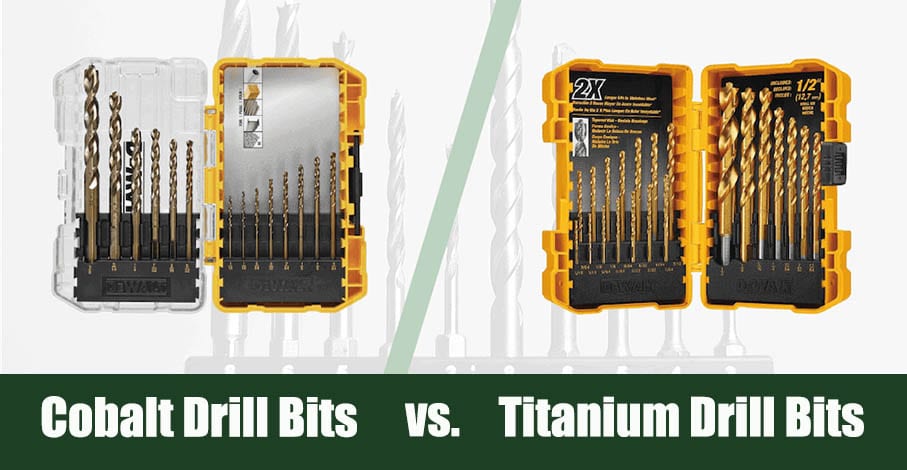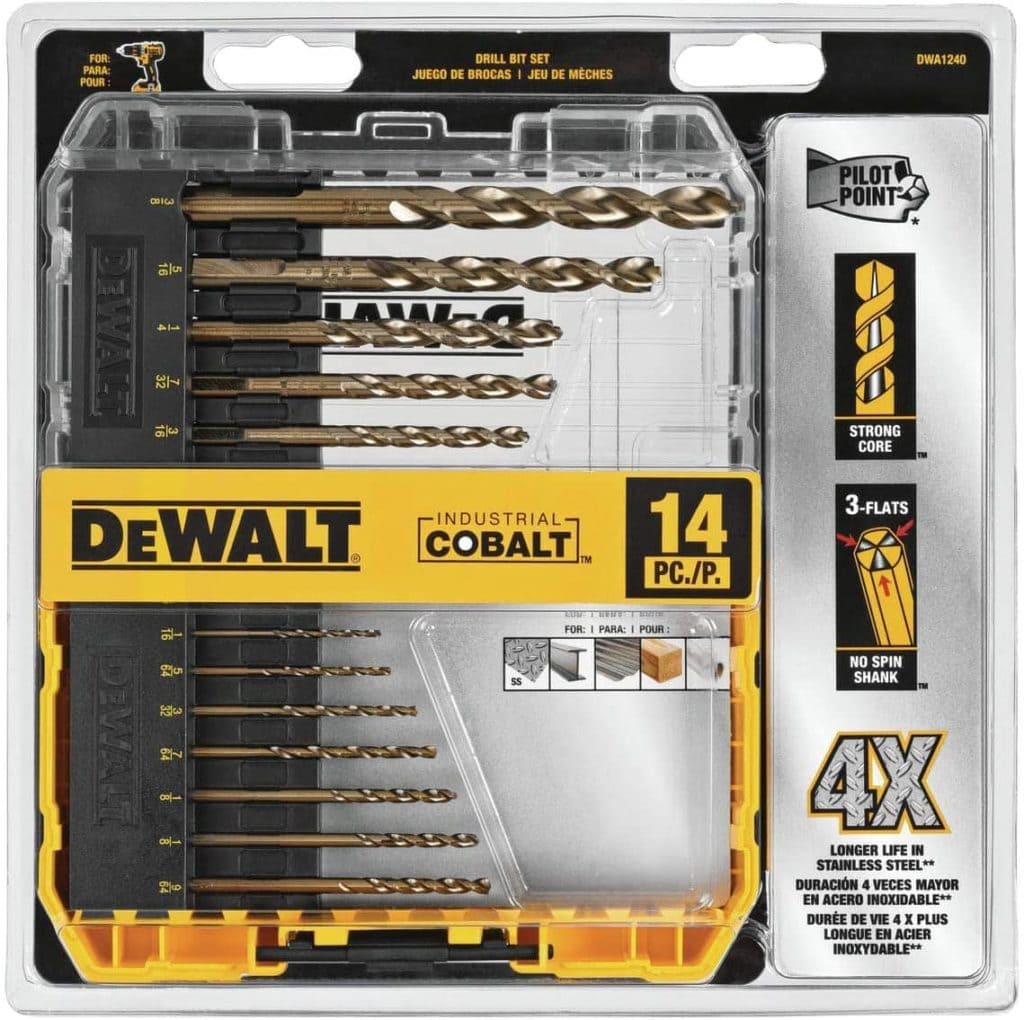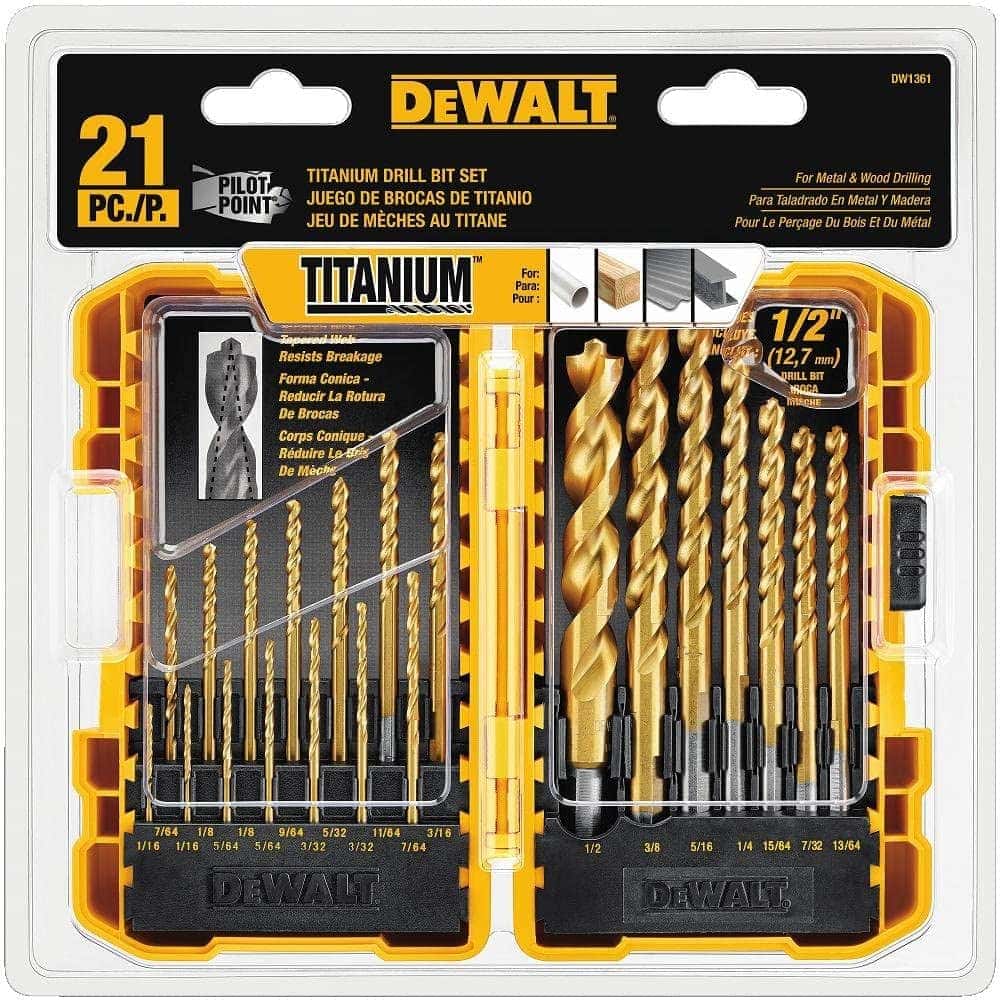Cobalt vs Titanium Drill Bits: Which is Best?
-
Pete Ortiz
- Last updated:

There is a wide range of drill bits available. One is not necessarily better than all the others, but they each have pros and cons. Choosing the right one is essential for completing any project correctly and efficiently. For most more challenging projects, you will choose between cobalt and titanium drill bits.
Both of these bits are designed to drill through metal, making them tougher than most drill bits. However, there are subtle differences between them. Each type is better for specific tasks, and your choice will largely depend on which projects you’re interested in.
- Related Read: Different Types of Drill Bits & Their Uses
Cobalt Drill Bits
Cobalt drill bits are designed for cutting through most types of metal, including stainless steel and cast iron. They are not made of pure cobalt, which we will discuss in depth shortly. However, they contain a bit of cobalt, which is where they get their name from. Despite their primary use for metal, they can also be used for softer materials. They’re very tough bits, making them suitable when others just won’t do.
Material
Cobalt drill bits are made with a mixture of cobalt and steel alloy. They’re usually around 5% to 8% cobalt, with the rest being steel. This makes them extremely durable and able to go through the most rigid materials, like cast iron.
The cobalt also prevents the bit from getting too hot as it spins against other metals. Cobalt bits have no coating, which differs from titanium drill bits.
Sharpening
Cobalt bits are pretty easy to sharpen. They do not have a coating, so there is no surface stripping when sharpening them. This gives them a longer lifespan, which saves you money over the long term. You can sharpen cobalt bits many times before they become unusable.
Temperature
All metal-on-metal bits are going to heat up. That is just the nature of rubbing two pieces of metal together. However, cobalt blades are made to dissipate heat. Cobalt is particularly good at dissipating heat over the contact surface. They can dissipate heat very quickly, even at top speeds.
You don’t have to worry about one of these bits getting very hot.
- Related Read: The Best Way to Cut Metal Roofing – Reviews & Top Picks
Cost
Cobalt bits are expensive. However, they are more durable and long-lasting than other options, including titanium. Because of that, they can often save you money. It depends on whether you want to spend more money now or later.
Despite their higher price, cobalt bits tend to provide pretty good value for the cost because you can use them for so long.
- Good for metal
- Long-lasting
- Expensive
Titanium Drill Bits
Titanium drill bits are similar to cobalt drill bits. They are also made to drill through tougher materials, like metal. However, a few slight differences set them apart from their Cobalt cousins, even though they look very similar at first.
Material
Titanium drill bits are not entirely made with titanium. Instead, they have a metal core and a titanium coating. Titanium is essential for preventing overheating, as we’ll discuss below. However, the bits do not contain any cobalt.
While the differences in the materials used to manufacture them are significant between cobalt and titanium drill bits, in practice, you probably aren’t going to notice a huge difference. There are only a few situations where the material sets the bits apart.
Sharpening
Titanium blades have a coating. Over time, it will wear off. The bit would have lost much of its heat resistance when the coating is completely gone. This is a problem when drilling metal since metal-on-metal can get very hot quickly.
When you sharpen titanium drill bits, the coating comes off. You can’t sharpen the titanium drill bits very much before they become unusable. They have a short lifespan.
Temperature
Most drill bits designed for tougher materials have design features that dissipate heat. For titanium drill bits, it’s the titanium coating. This coating protects the metal core from heat and dissipates it along the surface.
However, the coating does wear down over time. Once it gets thin enough, it won’t do its job correctly.
- Related Read: The Best Way to Cut Sheet Metal – Reviews & Top Picks
Cost
Titanium drill bits are usually cheaper than cobalt bits. However, they don’t last as long because the coating comes off over time. As you might imagine, this can cost you more money in the long run.
Of course, some people don’t need a durable bit that will last a long time. A titanium drill bit is likely sufficient if you need to drill a few holes. However, those who drill into metal often need to replace their titanium bits, which can add up.
- Functionally similar to cobalt bits
- Cheaper
- Not long-lasting
Which One to Use?
Once again, neither of these drill bits is better than the other. It depends on which material you’re working with and what you’re trying to accomplish.
For Versatility, Go With Cobalt
If you work with various materials, you probably want a set of cobalt bits. They will last longer and can be used with even the toughest materials. They are best for professionals, though DIYers working on several projects will also appreciate them.
Of course, this assumes you have a bit of money to spend upfront. Cobalt bits are more expensive than titanium ones, but they last longer, so you’ll save more in the long run.
For Working with Wood and Soft Metal, Choose Titanium
With that said, titanium bits are best for wood and softer metals. With softer materials, they cost you less upfront and won’t wear down quickly. They will need more frequent sharpening with harder materials, which can wear their coating down quickly.
All in all, both of these bits dissipate heat well and can handle tougher materials. Which option you choose depends on how much money you have to spend upfront, how often you plan to use the bit, and which material you need to drill.
You might also be interested in:
- How Much Does it Cost to Drill a Well?
- How to Drill Through Metal (Step-by-Step DIY Guide)
- What is a Jobber Drill Bit?
Contents





